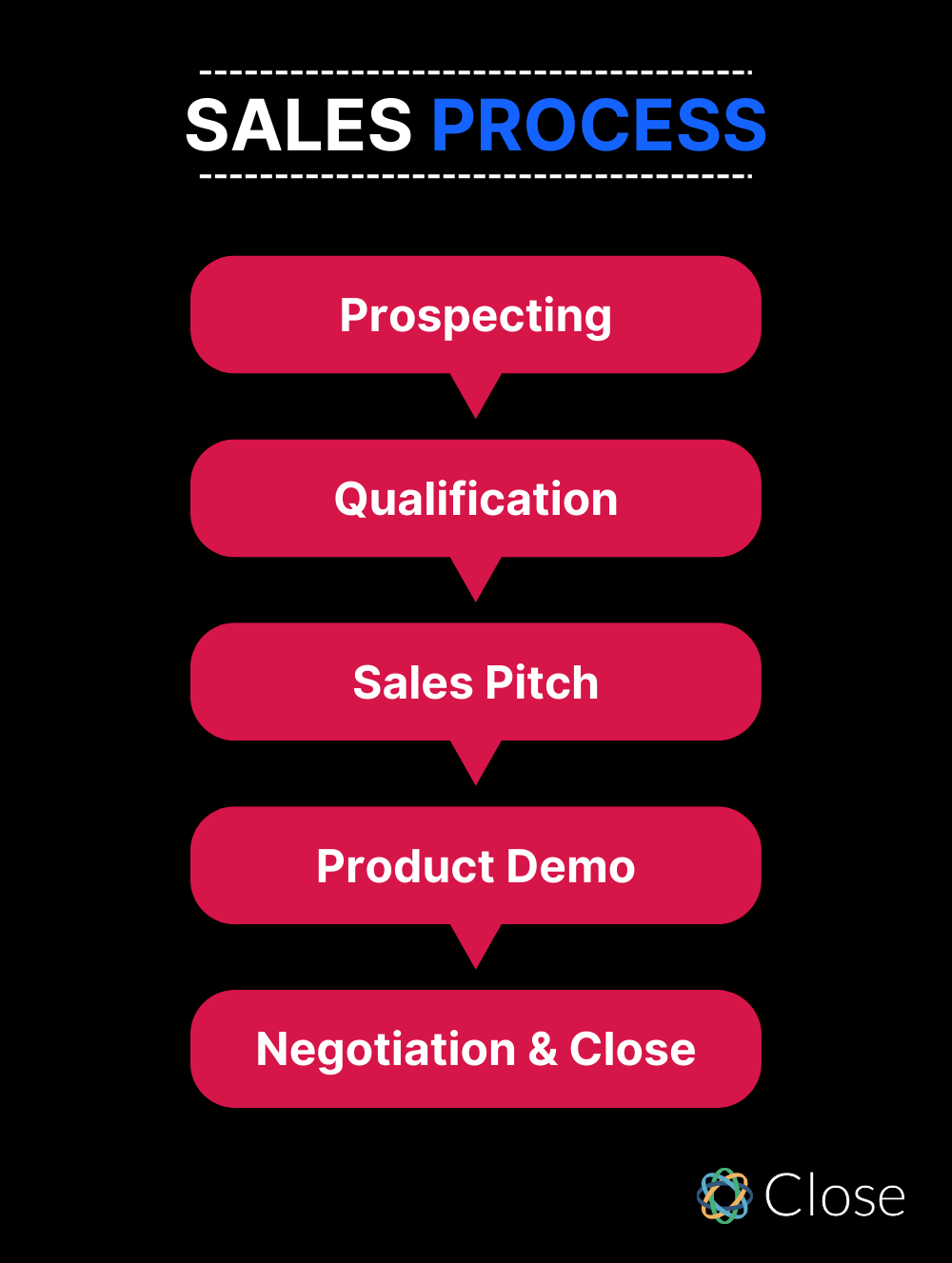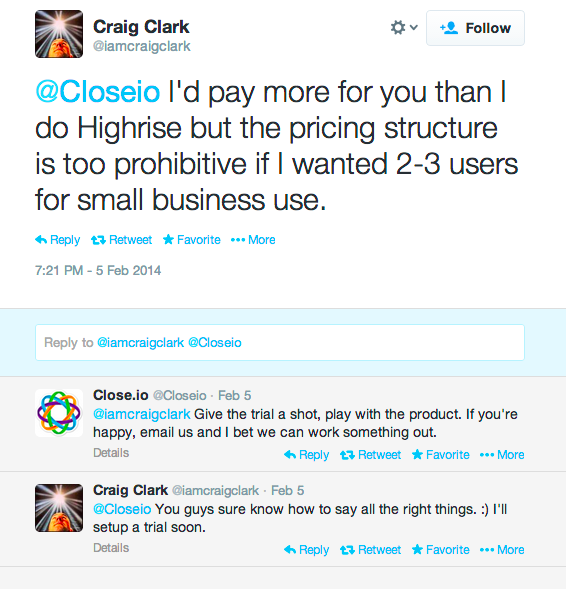
Whether you're negotiating with customers, partners, or investors—the fundamental rules of every sales negotiation are the same. It's all about creating agreements between parties with different interests and objectives.
Sales professionals who have been around the block know that negotiation isn’t about charisma, expensive suits, or slick rhetoric. It’s about providing value and getting out of your comfort zone to get things done.
Let’s talk about where sales negotiation sits in your sales process, and dig into proven strategies, tips, and skills you’ll need to negotiate a win-win, every time.
DOWNLOAD THE FOUNDER'S GUIDE TO SALES NEGOTIATION→
How Sales Negotiation Fits in the Sales Process
Sales negotiation is the conversations a seller has with potential customers, hopefully leading to a closed deal. The goal—reach an agreement that sets the stage for a long-lasting, profitable relationship between you and your prospect. This requires key negotiation skills such as empathy, preparedness, and conversation skills.
In your sales process, negotiation should come toward the end. After you’ve already given your sales pitch, shown a demo of your product, and identified key decision-making stakeholders, it’s time to start negotiating terms that will make everyone happy.
 |
4 Stages of Sales Negotiation
The sales negotiation process involves four key steps:
- Prepare: Preparation is key to negotiation success. Make sure you understand both sides of the conversation, and prepare for any obstacles that may come up during the meeting. Lastly, prepare a clear agenda that sets out what needs to be discussed, and how you’ll do that during the meeting. Share this agenda with your prospect so that both sides can be prepared for productive negotiation.
- Initial Exchange: Once the meeting starts, both you and your prospects should be ready to set terms and conditions for this deal. Your sales team should ask questions about the prospect’s goals, obstacles, and any hard negotiating points where they’re not willing to budge.
- Collaboration: Now it’s time to put your bargaining skills to the test. There will always be points of disagreement during negotiations, so you need to collaborate with your prospect to see where you can both give and take to reach a happy agreement.
- Commitment: Once you have a verbal agreement for the terms, it’s time to put it in writing. Set up a formal agreement by getting contracts ready, approved, and signed.
Of course, this all looks easier on paper than in reality. So, let’s talk about the strategies and tips that top sales reps and professionals use to close more deals.
12 Proven Sales Negotiation Strategies & Tips from Negotiation Experts
Experience is the best training program for sales organizations—but short of that, you can learn a lot from the experience of others.
Let’s dive into 12 incredibly powerful negotiation techniques and sales tips that you can use to close better deals and streamline your sales cycle.
1. Be Willing To Walk Away
The very first thing before you engage in any negotiation is to know your price. At what point would you walk away from the negotiation because it’s no longer worth it?
While trying to reach a win-win in every negotiation is a noble goal, this simply isn’t realistic. By drawing a firm line in the sand that you will not cross, you’ll save yourself from putting time and energy into a negotiation that could end up hurting your own interests.
2. Know When to STFU
Sometimes the best thing you can do when negotiating on the phone or in person is to keep quiet.
For example, let’s say the other person gives you a ridiculously bad offer and waits for your response—just keep your mouth shut and let them drown in awkward silence. In one negotiation, using silence saved our startup $225,000.
Knowing when to shut up also means knowing when to listen. John Li, Co-Founder and CTO at Fig Loans, says this about listening in negotiations:
“When you don’t understand how to actively listen, you risk looking pushy, egotistical, and self-serving—those are the sales stereotypes we’re trying to break.
Though you know the time you have to convince someone is quite limited, you should never interrupt a customer and always allow them to speak before you. What someone says offers vital clues into their motives and needs, so listen and gather as much as you can from them before you continue speaking.”
3. Make Sure You’re Negotiating With the Right Person
Negotiation only works when you’re working with someone who has decision-making power. If not, you’re wasting your time.
Tom Leighton, COO of Sofary, says this about negotiating:
“The most crucial thing is to ensure that you’re doing so with the right person. Only negotiate with the decision maker from the start, to avoid wasting your time and resources.
Moreover, if you start negotiating at lower levels, you are likely to have discounted the product significantly before meeting with the decision-maker. When you do finally have this meeting, you’ll be at a significant disadvantage during the negotiations.”
4. Give the Prospect a Measure of Control
Ever been in a sales conversation that's been going nowhere? A negotiation that's been stuck? There's a magic four-word sentence that can resolve these situations and help you get a real dialogue going. Just say the words: "Help me out here."
Asking for help shifts the dynamic of the conversation and helps the prospect let their guard down. This helps you pave the way for a meaningful conversation.
Gauri Manglik, CEO and Co-founder of Instrumentl, explains another way to do this:
“Try to get your prospect to feel like they're in control of the process. That way, you can use their need for control as a motivator to make them want to buy from you.
The best way to do this is by identifying what kind of person they are and what they value—where do they want to be in 5 years? How much will this product help them get there?
What does their ideal day look like? How can I help them achieve that ideal day more easily? By identifying these things and communicating them back to your prospect, you can help them feel like they're gaining power over their future.”
5. Never Negotiate Alone
Whether you're a natural-born dealmaker or not, negotiating consumes your time and energy. The longer you’re engaged in a negotiation, the more emotionally invested you become in making a deal happen—no matter the terms.
At this stage, a great negotiation tactic is to pair up with someone on your team who wasn’t involved in the negotiation until now and has no stake in it. Having that set of fresh eyes will help you balance the negotiation and make sure you’re not desperately trying to close a bad deal.
 |
For junior reps, pair negotiation is a good strategy. Pairing newer reps with more experienced reps can help them negotiate deals more effectively.
Pro Tip: Negotiating over the phone and need help from a teammate? Use Close’s Call Coaching features to invite a peer or your manager into an active call. They can either Listen without being heard, Whisper to you only, or Barge the call to be heard by both parties. Try it for free now.
6. Figure Out What Negotiation Style to Use
When we think of negotiators, we often picture Wolf of Wall Street personalities—people who bulldoze the other party and ruthlessly manipulate to get as much as they can. This isn’t the model you want to emulate when negotiating.
But negotiation styles don’t have to be limited to either the wolf or the lamb.
A negotiation style that I recommend to sales reps is using friendly strength. This means being kind and helpful, but standing firm where it matters. Channel the confidence you have in your product and your expertise in the field to fight for the value your product provides, without losing your calm, friendly demeanor.
7. Anchor the Discussion on Your Terms
Anchoring is a psychological hack that sets the tone for the discussion and can help you avoid giving large discounts.
While many gurus will tell you to ask the prospect about their budget before offering a price, science tells us that doing the opposite will actually help your deal.
Will Yang, Head of Growth at Instrumentl explains:
“Start by anchoring the discussion on your terms: If you’re the first to make an offer, you have a chance to establish what’s considered normal or fair in the conversation. Studies have shown the person who makes the first offer in a negotiation tends to set the tone for the entire discussion.”
8. Flip Questions
During negotiations, your prospect may ask questions you can’t answer or you don’t want to answer without some clarification.
Instead of giving an off-the-cuff answer, flip the question back to them. For example:
- In an ideal world, what would you want the answer to be?
- How does this play into the larger context?
- Why is that important to you?
Turning questions back on the other party can be a great way to discover creative opportunities to build more value for your prospects.
9. Know Your (And Their) BATNA
BATNA stands for Best Alternative to a Negotiated Agreement. Basically, this means knowing what your best alternative is in case negotiations fall through and you can’t make an agreement.
Knowing your own alternative shows you when the deal is no longer worth pursuing and gives you negotiating power. On the other hand, knowing the best alternative for your prospect can help you during negotiations by highlighting issues with their backup plan, and give you the power to negotiate better terms for everyone involved.
10. Find a Way to Make Everyone Happy
Win-win outcomes aren’t always possible, but it’s the job of a good negotiator to try their best to make it happen.
One of the best ways to build win-win situations at the negotiation table is to remember that you’re trying to build long-term relationships.
Jack Underwood, CEO & Co-Founder of Circuit, explains:
“Negotiations are hopefully the beginning of fulfilling long-term business relationships and partnerships. If you’re too harsh during negotiations or put your business’s best interests about your clients, you’re starting that relationship on very rocky ground.
The first step to building trust is this negotiation, so protect your and your client’s interests to find a fair solution. When prospects can sense that you’re “on their side,” they won't forget it.”
Also, remember that providing concessions for prospects shouldn’t be one-sided. It’s your right to ask for something in return. This signals that your concession is valuable to you and helps them feel like they got a good deal.
11. Get a Pre-Approved LOI Template
If you're negotiating a big deal with a large organization, it can take months to get a deal signed simply because the buyer’s legal department will try to unload as much risk as possible on you. In startup time, this time can be the difference between succeeding and going out of business.
Instead, get your LOI (Letter of Intent) template directly from your buyer. By asking them to share an LOI or contract already approved by legal when buying something similar, you have a perfect template that legal already likes that you can adjust to fit your needs.
12. Know When to Take a Break
You try to sell based on value, but your prospect is stuck on price and will not budge without some kind of discount.
When they reach this kind of impasse in a negotiation, many sales reps either keep pushing, or relent. But negotiation is often about creating new options—in this case, the best option is to postpone the decision.
For SaaS companies, offer for them to buy the product at full price now, and jump on a call in a month to see the value they’ve received and decide on a fair price for both parties.
If this isn’t possible with your product, postponing can still work. Offer to let the deal sit as-is for a month, and come back to the negotiation table after both parties have time to simmer. This can give prospects time to see how much they’re losing by not making a decision, and they may be more willing to negotiate when you return.
Negotiation Skills You Need to Close Better Deals
Strategies are important—but it takes real skill to set up an effective negotiation and become a sales leader. If you want to improve your negotiation skills, start with these five selling skills.
Empathy
Understanding the other person can help understand why certain aspects of the negotiation are so important to them, making it easier to negotiate with them.
Mike Nemeroff, CEO and Founder of Rush Order Tees, says:
“With empathy, a salesperson can put themselves into the other party’s shoes and understand their point of view. This helps them form more compelling arguments, become more persuasive, and keep the conversation flowing. This leads to better outcomes and smoother overall negotiations.”
Jack Underwood adds this:
“Look at a prospect as a partner, not an adversary. You need to be assertive to get what you want from the negotiation process, but you should remain calm and confident. Push for what’s best for everyone—not just you.”
Reading (and Displaying) Body Language
Every salesperson knows being able to read body language is key to negotiating effectively. But controlling your own body language is also important.
“The art of great negotiation isn’t always about what you say or hear but what you see,” says Marina Vaamonde, founder of HouseCashin. “Non-verbal cues like body language and tone of voice matter on both sides, so be sure to take stances and use tones that come across as confident, friendly, and open. Conversely, avoid using non-verbal cues that make you look nervous, which your clients may perceive as an opening to push the deal in their favor.
"On the other side of the table, watch your prospect’s body language closely and use those unspoken cues to guide your next moves. One incredibly effective tactic is mimicry, in which you take on a similar stance and tone to the other party. Mimicry helps negotiators to build rapport, find common ground, and build trust, though it should be done subtly and naturally within the interaction.”
Arthur Worsley, Founder of The Art of Living, adds:
“Your body language, your facial expressions, and the tone of your voice can play a significant role in how the negotiations play out. This is why it’s critical to remain calm even as the negotiations become intense. Don’t let your anger or frustration show in your tone, facial expressions, or body language. It’s also important to avoid being too subversive in your demeanor as the prospect may pick up on this, and use it to your disadvantage.”
Preparation
Preparation comes in many forms—whether you are researching your prospect, going through role plays with your sales manager, or prepping for obstacles and objections.
Here’s what Will Yang says about being prepared:
“Use information asymmetry to your advantage: When one party has more information than another, they have more power. In a sales context, this could mean being aware of your competition, understanding your buyer’s needs, and knowing your product inside out. Use this knowledge throughout the negotiation process to keep yourself in a position of strength.”
Preparation will also help you respond to objections, such as discount inquiries. Here at Close, we sell a premium SaaS tool, and often get discount inquiries from people who have never tried our product.
We prepared an easy talk track to respond to these inquiries, asking the person to try out a free trial first. If they decide it’s a good fit, we can come back and discuss pricing.
We’ve been using this since 2014, and it still works:
 |
Conversation Skills
Any good salesperson should continuously work on their people skills and conversation abilities. But this is especially important when it comes to sales negotiations.
Here’s what Mark McShane, Managing Director of Sheffield First Aid Courses, says about the tone of negotiation conversations:
“When it comes to sales negotiations, the most important thing is to keep every conversation light. Strive to diffuse any tension that may arise when negotiating with a prospect, and do everything in your power to keep the interaction from becoming toxic and/or hostile. Remain jovial and lighthearted throughout the conversation, so that there’s no buildup of resentment between you and the prospect.
Moreover, make sure that you remain calm throughout, despite how the conversation is turning out. Openly showing your frustration when the discussion isn’t going your way will likely be a major turn-off for the potential customer.”
Renegotiation
Sometimes you agree to terms that aren't good for you, or circumstances change and a previously good agreement now is hurting you. Even seasoned pros can get into this situation. When this happens, it’s time to renegotiate.
First off, ask yourself: Am I willing to lose this deal? If not, it’s better not to try to renegotiate—you’ll come off as desperate and lose your credibility.
If you are ready and aware that you may lose the deal, go in with friendly strength. Explain that the deal is no longer providing value to both parties, and that you can’t serve them long-term with the deal you negotiated. Then, ask if they’re open to talking about a number that would benefit both parties and give the deal more longevity.
This skill is hard to develop, but it works. We once renegotiated a deal with one of our largest customers, and they eventually agreed to double their spend with us because they saw the value we provided.
Start Using These Negotiation Tactics Today
You've been reading—now it's time to implement these negotiation strategies and skills.
Know the line in the sand where you’ll walk away from a deal. Give the prospect a measure of control, and keep looking for the point where both parties can be happy. Choose a negotiation style of friendly strength, coupled with empathy and well-developed conversation skills.
With these tips and tricks, you’ll be able to negotiate better deals that drive more revenue and develop longer-lasting relationships with customers.
Want more proven negotiation tips? Get my book, The Founder’s Guide to Sales Negotiation.









